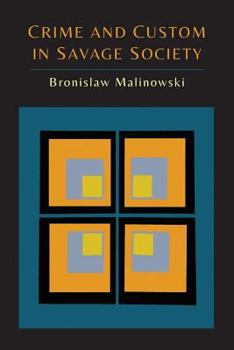Crime and Custom in Savage Society
Select Format
Select Condition 
Book Overview
2014 Reprint of 1926 Edition. Full facsimile of the original edition, not reproduced with Optical Recognition Software. "Crime and Custom in Savage Society" represents Bronislaw Malinowski's major discussion of the relationship between law and society. Throughout his career he constructed a coherent science of anthropology, one modeled on the highest standards of practice and theory. Methodology steps forward as a core element of the refashioned anthropology, one that stipulates the manner in which anthropological data should be acquired. Malinowski's choice of law was not inevitable, but neither was it unmotivated. Anyone interested in understanding the social structure and organization of societies cannot avoid dealing with the concept of "law," even if it is to deny its presence. Law and anthropology have shown a natural affinity for one another, sharing a beneficial history of using the methods and viewpoints of one to inform and advance the other. The best lesson Malinowski provides us with comes in the last paragraphs of "Crime and Custom in Savage Society": "The true problem is not to study how human life submits to rules; the real problem is how the rules become adapted to life." On that question, he has left us richly inspired to continue the quest.
Format:Paperback
Language:English
ISBN:161427682X
ISBN13:9781614276821
Release Date:August 2014
Publisher:Martino Fine Books
Length:150 Pages
Weight:0.76 lbs.
Dimensions:0.3" x 6.1" x 9.2"
Customer Reviews
1 rating
How does "law" work among the natives in Papua New Guinea?
Published by Thriftbooks.com User , 19 years ago
This is a clever book. I am not a professional anthropologist, but I have still profited from reading it. A good piece of science with good observations and intelligent conclusions ages well. Written in the 1920s and based on observations Malinowski has made during WW I in Papua New Guinea, "Crime and Custom in Savage Society" deals with "law" in traditional society. Malinowski is fighting the view that prevailed among anthropologists at that time, which was that people in traditional societies follow the clan rules in a quasi instinctive manner, unable to diverge from the rules. He disagrees and makes his point on the basis of a number of observations that he made while on the Trobidand islands. The islanders did not at all slavishly adhere to the rules of tribal culture. Instead, sometimes they strove to circumvent the laws just as western businessmen sometimes try to evade tax law. The rules are what differs between their societies and ours, and the amount of codification of these rules, but not basic human psychology towards "the law". A multitude of human behaviors in the face of rules and regulations of different types exists in Europe and in Papua New Guinea. I find the conclusions both highly interesting from a cultural point of view and also anti-racist: The natives on the coral islands on the other side of the world show complex human social strategies if confronted with rules and regulations just as we do. Malinowski is considered one of the the first proponents of modern, scientific anthropology. I can definitely see why - he is a sharp observer and puts things intelligently in context. These skills will never go out of fashion in science.





